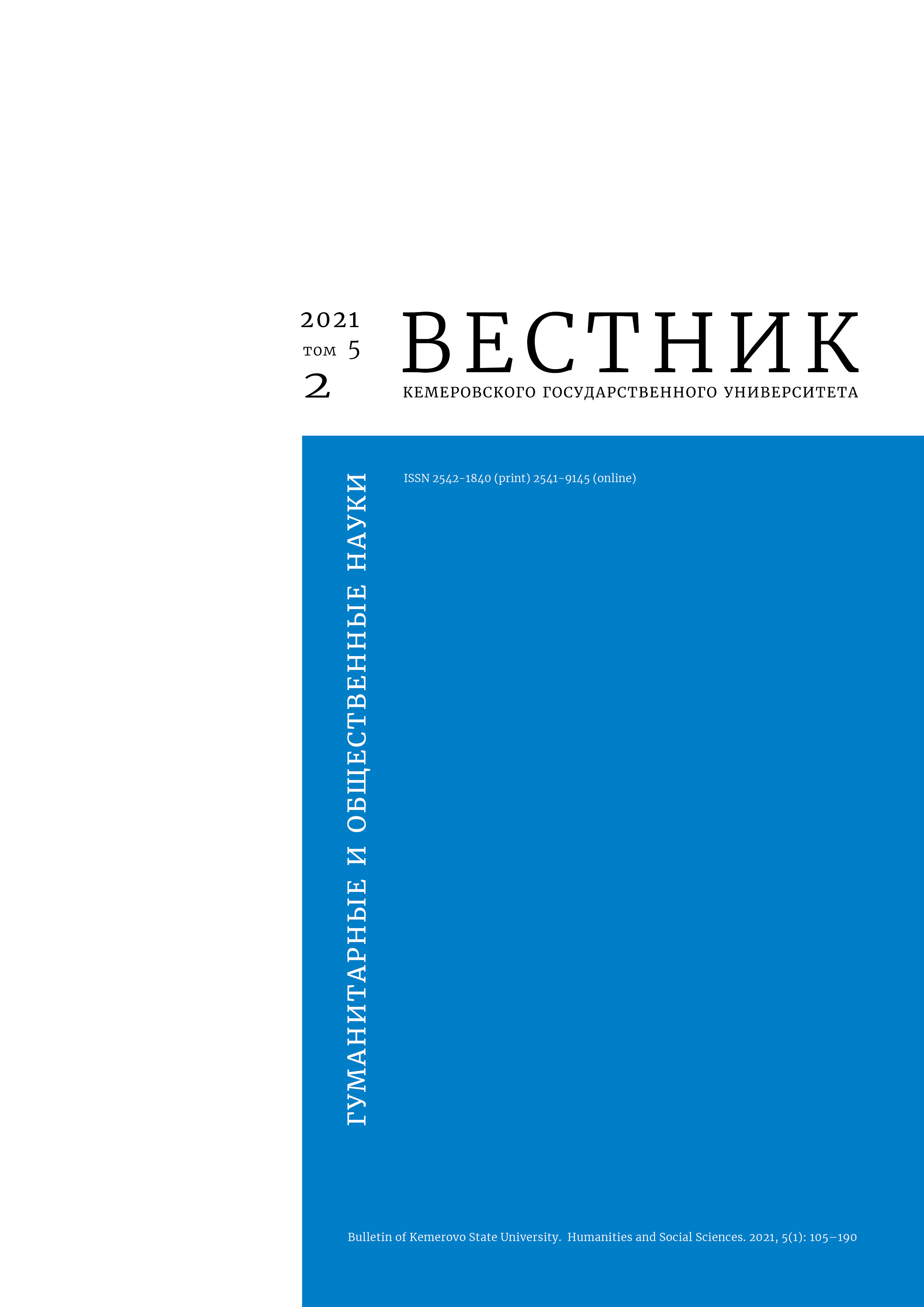Kemerovo, Russian Federation
Kemerovo, Russian Federation
Secondary School No. 80
Kemerovo, Russian Federation
VAC 13.00.02 Теория и методика обучения и воспитания (по областям и уровням образования)
The research featured the intellectual abilities of teenagers with different levels of stress resistance. The research objective was to describe the options for intellectual development of secondary school students depending on their stress resistance level. The authors reviewed various approaches to intellectual development of younger adolescents. They proposed a set of assessment techniques for the level of mental development. The research revealed the effect of stress resistance on the intellectual abilities of teenagers. Teenagers with a low level of stress resistance were excitable and careless, while demonstrating tender conscience and poor analytical and verbal skills. Respondents with a high level of stress showed a low level of excitability and conscientiousness, a high level of carelessness, a good ability to establish analogies, and admirable verbal abilities. The paper contains some useful recommendations for teachers and parents on the development of teenagers' intellectual skills based on their level of stress resistance.
psychological profile of students, stress, emotional stability, opportunities, diagnostic tools, individual psychological characteristics
1. Sukhov A. N. Social psychology, ed. Sukhov A. N. Moscow: YuNITI-DANA, 2012, 615. (In Russ.)
2. Akimova M. K., Kozlova V. T. Accounting for the psychological characteristics of students in the learning process. Voprosy psikhologii, 1988, (6): 71-77. (In Russ.)
3. Dodonova Yu. A., Tikhomirova T. N. General intelligence, social intelligence and creativity: structure and dynamics in the context of the educational environment. Teoreticheskaya i eksperimental'naya psikhologiya, 2010, 3(2): 5-15. (In Russ.)
4. Holodnaya M. A. Psychology of intelligence. Paradoxes of research. Moscow: Iurait, 2019, 334. (In Russ.)
5. Abulkhanova-Slavskaia K. A. Activity and personality psychology. Moscow: Nauka, 1980, 335. (In Russ.)
6. Znakov V. V. A. V. Brushlinsky's individual psychology and psychology of human existence. Vestnik Kostromskogo gosudarstvennogo universiteta im. N. A. Nekrasova. Seriia: Pedagogika. Psikhologiia. Sotsialnaia rabota. Iuvenologiia. Sotsiokinetika, 2008, 14(4): 4-10. (In Russ.)
7. Rubinstein S. L. Fundamentals of general psychology. St. Petersburg: Piter, 2015, 705. (In Russ.)
8. Golubeva E. A. Abilities. Personality. Individuality. Dubna: Feniks+, 2005, 512. (In Russ.)
9. Rusalov V. M. Biological foundations of individual psychological differences. Moscow: Nauka, 1979, 352. (In Russ.)
10. Balandina L. L. Emotional intelligence and its corellation with temperament features. Vestnik Perm. gos. gumanit.-ped. un-ta. Ser. № 1. Psikhologicheskie i pedagogicheskie nauki, 2017, (1): 5-14. (In Russ.)
11. Druzhinin V. N. Psychology of general abilities. St. Petersburg: Piter, 2007, 368. (In Russ.)
12. Volkova N. E. The ratio of general (creativity, intelligence) and conceptual abilities in girls during early adulthood. Akmeologia, 2018, (3): 52-57. (In Russ.)
13. Bratashova M. V. Learning motivation as a factor in the development of intellectual abilities of younger adolescents. Izv. Saratov Univ. (N. S.), Ser.: Philosophy. Psychology. Pedagogy, 2020, 20(1): 94-99. (In Russ.) DOI:https://doi.org/10.18500/1819-7671-2020-20-1-94-99
14. Levitskaya L. V., Chernova A. A. Psychological features of adolescence and their effect on stress coping. Molodoi uchenyi, 2016, (9): 1036-1039. (In Russ.)
15. Selye H. Stress without distress, ed. Kreps E. M. Moscow: Progress, 1982, 124. (In Russ.)
16. Tserkovsky A. L. Modern views on the problem of stress resistance. Vestn. VGMU, 2011, 10(1): 6-19. (In Russ.)
17. Mikheeva A. V. Stress stability: the problem of notion. Vestnik RUDN. Voprosy obrazovanija: jazyki i special'nost', 2010, (2): 82-87. (In Russ.)
18. Krasnova M. A. Stress resistance of adolescent students. Academy, 2016, (6): 103-105. (In Russ.)
19. Anokhina S. A. Tendencies in developing teenagers stress resistance. Vestn. S.-Peterb. un-ta. Ser. 12, 2008, (1): 215-221. (In Russ.)
20. Fedorova A. M., Firsova D. V. The comparative features of forming stress resistance at adolescents involved in musical performance and martial arts. Vestnik kafedry UNESCO "Muzykal'noe iskusstvo i obrazovanie", 2015, (1): 66-75. (In Russ.)
21. Zhdanova L. G., Manakhova N. M., Sukhova M. A. Stress resistance of high school students with different level of creativity. Balkan Scientific Review, 2019, 3(3): 70-72. (In Russ.) DOI:https://doi.org/10.34671/SCH.BSR.2019.0303.0017
22. Semenovskikh T. V. Interrelation of tolerance and resistance to stress at the advanced teenage age. Internet-zhurnal Naukovedenie, 2015, 7(5). (In Russ.) DOI:https://doi.org/10.15862/139PVN515
23. Akimova M. K., Borisova E. M., Kozlova V. T., Loginova G. P. A guide to the use of the group intelligence test (GIT) for younger adolescents. Obninsk: Printer, 1993, 11. (In Russ.)
24. Aleksandrovskaia E. M. Adapted modified version of R. Kettell's children's personality questionnaire. Moscow: Folium, 1995, 34. (In Russ.)
25. Kovalevskaya A. A. Stress stability of adolescents. Problemy sovremennogo pedagogicheskogo obrazovaniia, 2018, (61-2): 298-300. (In Russ.)
26. Molodtsova T. D. Prophylaxis of stresses for teenagers in the conditions of school society. Vestnik Taganrogskogo instituta imeni A. P. Chekhova, 2017, (2): 115-120. (In Russ.)
27. Anokhina S. A. Dynamics of the development of stress resistance of adolescents. Vestnik Sankt-Petersburgskogo universiteta MVD Rossii, 2007, (2): 130-136. (In Russ.)
28. Lizunova E. V. To the question about the formation of stress tolerance in adolescents dangerous situations. Karelskii nauchnyi zhurnal, 2015, (1): 45-48. (In Russ.)
29. Blokhina M. A. Formation of stress resistance in adolescent children through socio-pedagogical training. Studencheskaia nauka i XXI vek, 2012, (9): 413-416. (In Russ.)
30. Ovchinnikova Ju. V., Gychev A. V., Grickevich N. K. Psychological and pedagogical means for development of creative abilities of adolescents at institutions of extended education for children. Vestnik Tomskogo gosudarstvennogo pedagogicheskogo universiteta, 2012, (6): 183-189. (In Russ.)


















